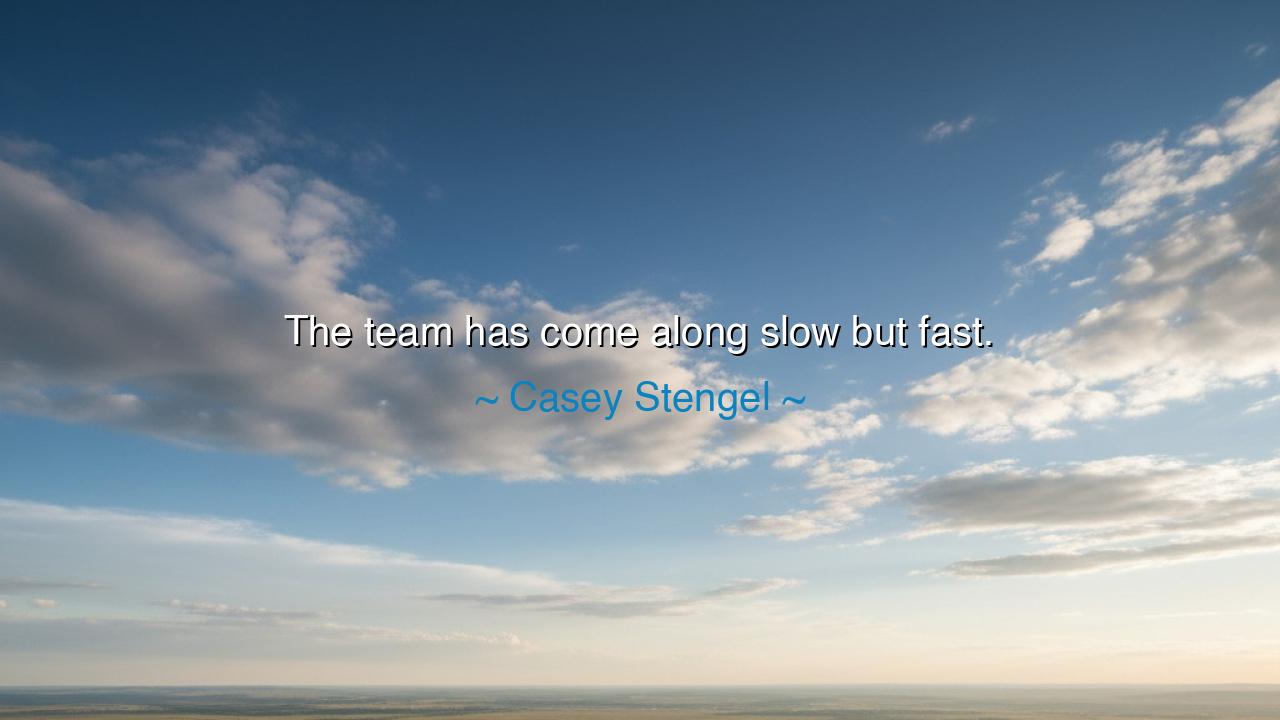
The team has come along slow but fast.






When Casey Stengel, the master of wit and paradox, proclaimed, “The team has come along slow but fast,” he was not speaking nonsense, but revealing a mystery of growth that all who strive together must one day face. For in these words lies the truth that progress is never a straight road. At times, it seems plodding, frustrating, weighed down by obstacles; at other times, it suddenly surges forward, leaping beyond expectation. Stengel, in his playful and almost riddling way, captured the strange rhythm of development—both in baseball and in life itself.
The origin of this saying lies in Stengel’s long career as a manager, where he guided not only champions but also struggling teams. He saw rookies learning the game, stumbling through errors, appearing to move slowly in their growth. Yet he also saw that one day, almost without warning, those same players seemed transformed, playing with speed, skill, and confidence. What seemed “slow” in the day-to-day revealed itself, in the sweep of time, as astonishingly “fast.” Thus, Stengel named the paradox: a team’s rise appears sluggish in the moment, but swift when viewed in hindsight.
The ancients would have nodded at his wisdom. The farmer tills the soil, day after day, seeing little change. The seed lies hidden, invisible. Growth feels slow, almost painfully so. But then, suddenly, the stalk bursts forth, the harvest comes, and what once seemed stagnant is revealed as rapid abundance. So too with the soldier in training, the student at study, the artist at work. The toil feels endless—but when the moment of testing arrives, all that slow labor erupts into swift mastery. This is the meaning of Stengel’s words: slow but fast is the true rhythm of becoming.
Consider the tale of the 1969 “Miracle Mets.” For years, the team had been a byword for futility, slow to learn, slow to build, stumbling again and again. Yet in one astonishing season, they surged forward, capturing the World Series and stunning the world. What had seemed slow in the making was, in truth, fast in the unfolding. The years of struggle had forged character and skill, hidden beneath failure, until suddenly it bloomed into triumph. This is the paradox of progress: what feels slow is often the swiftest path of all.
The lesson is clear: in your own life, do not despair if growth feels slow, if progress seems hidden. The greatest achievements are often prepared in silence, their roots spreading deep before the flower bursts forth. What seems like delay is often the very foundation of sudden success. As in baseball, so in life: teams, individuals, and dreams move slow but fast—appearing to crawl in the present, but racing forward when seen from the heights of time.
What then must we do? First, embrace patience. Do not curse the slow days of toil, for they are laying the groundwork for future speed. Second, remain vigilant: when the surge comes, be ready to ride it, for momentum arrives suddenly. Third, trust the hidden work of time. Just as a team learns, stumbles, and finally triumphs, so too do we grow in unseen ways before our victories appear.
Thus, Casey Stengel’s playful wisdom becomes eternal teaching: “The team has come along slow but fast.” Let us accept the paradox, for it is the way of all true progress. May we labor patiently in the slow hours, confident that one day, when the moment arrives, our growth will reveal itself as swifter than we ever imagined. For in the union of slowness and speed lies the secret rhythm of victory.






AAdministratorAdministrator
Welcome, honored guests. Please leave a comment, we will respond soon